When you’re getting married, there are so many exciting changes to look forward to: waking up every day with your spouse, the adventures you’ll go on, and the family you’ll build with each other.
With so much joy in your future, you may have overlooked one potentially grim detail: More time with your significant other almost always means spending more time with their families, too.
If spending the holidays with your in-laws fills you with dread, don’t worry, you’re not alone. Experts have weighed in on the subject and suggest that it’s our boundaries and expectations that make managing relationships with your partner’s family so notoriously difficult. Families tend to have a very peculiar way of dealing with life (and each other) that may not always be welcoming to a new face.
And while showing up to a family dinner with your in-laws can feel like being the odd man out, we wanted an inside perspective from couples and their families about what it’s really like to navigate the in-law dynamic. Read on as we peel back the layers behind in-law drama and animosity to determine how often in-laws cause discord in marriages, how much time spent together is too much time, and the lengths people go to impress their in-laws before a visit, according to over 950 people.
Distance makes the heart grow fonder
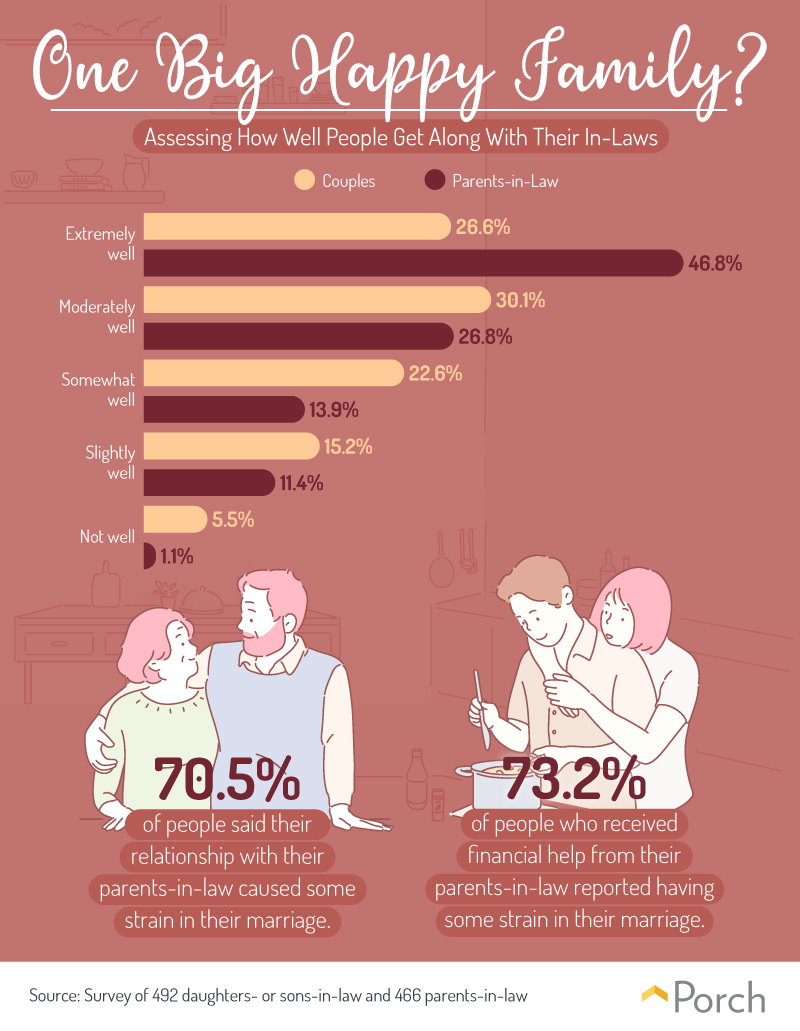
Is it possible to have a perfect relationship with your in-laws; one where there are never any awkward run-ins on social media or conversations at the dinner table that make you wish you could turn invisible or sink through the floor? For some people, the answer might be yes. According to 27 percent of married couples we polled and 47 percent of parents-in-law, spouses and in-laws get along “extremely well.”
Still, it was more common for couples to admit at least some strain in the relationship with their in-laws, including 30 percent who said they got along only moderately well and another 23 percent who said they got along just somewhat well. Twenty-seven percent of parents we polled acknowledged similar levels of distress, calling their relationship with their children’s spouse only “moderately” good.
If you’re married to someone who isn’t fully ready to let go of their parents (or whose parents aren’t ready to let go of their child), the odds are you’ll experience tension with your in-laws at some point in your marriage. Nearly 71 percent of people said their poor relationship with their in-laws caused strain on their marriage, followed by 73 percent of couples who received financial support from their in-laws and experienced similar marital pressure.
Feeling the strain
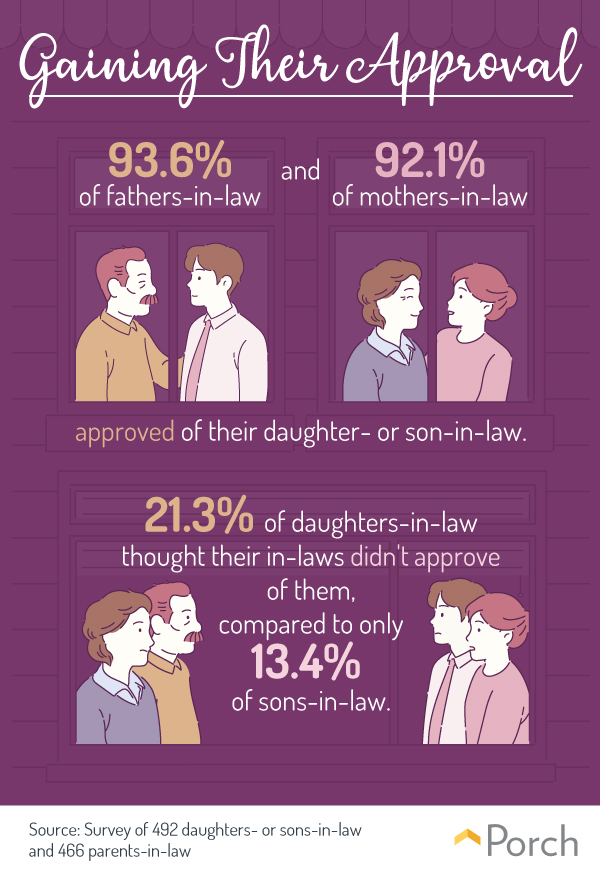 Even if the relationship between couples and their in-laws isn’t always perfect, the odds are your spouse’s family aren’t cursing the ground you walk on. Ninety-four percent of fathers and 92 percent of moms admitted to approving of the men or women their children married.
Even if the relationship between couples and their in-laws isn’t always perfect, the odds are your spouse’s family aren’t cursing the ground you walk on. Ninety-four percent of fathers and 92 percent of moms admitted to approving of the men or women their children married.
Still, that doesn’t mean you won’t feel anxious for their approval. More than 21 percent of women said they believe their spouse’s parents don’t approve of them, followed by just 13 percent of men who said the same. Perhaps unsurprisingly, experts on the subject say the relationship between mothers- and daughters-in-law is almost always the most complicated because it’s naturally more intimate and emotional than relationships between men or women and men.
Establishing barriers
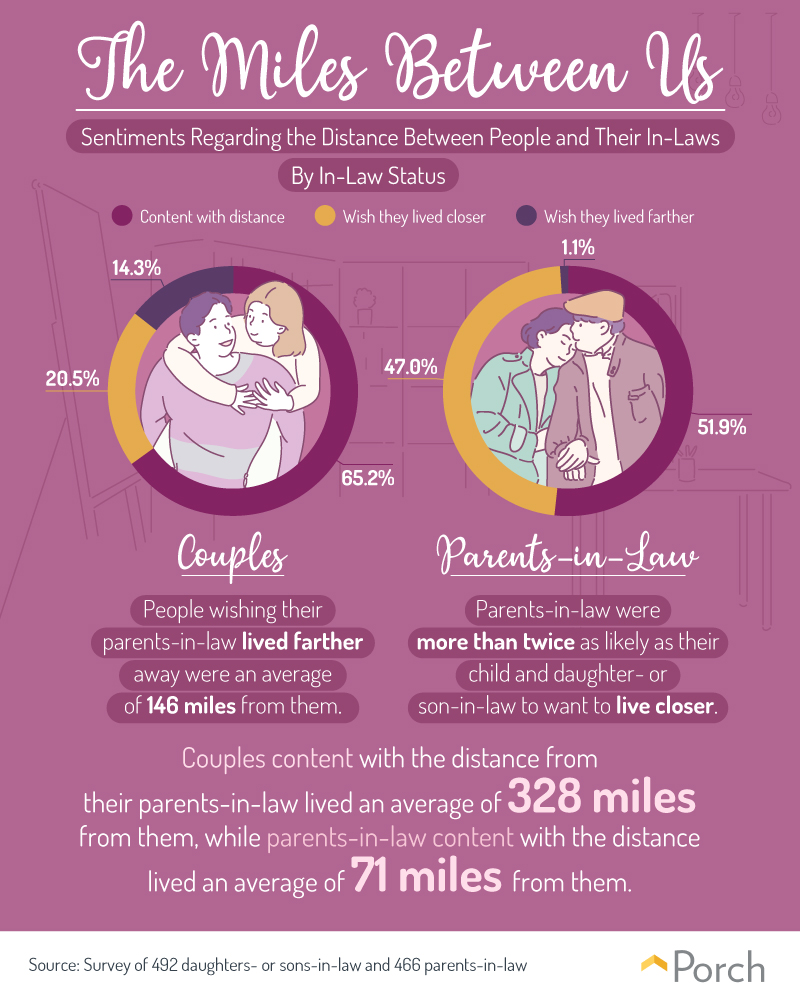
When it comes to dealing with overbearing in-laws, you might have to get creative in the way you avoid spending too much time with them or get out of turning every small event into a massive family get-together. Of course, there is one barrier that’s sure to put a healthy space between you and your spouse’s family: distance.
Naturally, the further away you live from each other, the less often you’ll have to see your in-laws against your will. And while 47 percent of parents we surveyed admitted to wishing their married children lived closer, 65 percent of couples suggested they were content with the distance as it was. Another 14 percent of couples wished their in-laws lived even farther away, despite already being separated by more than 146 miles, on average.
Getting the jitters
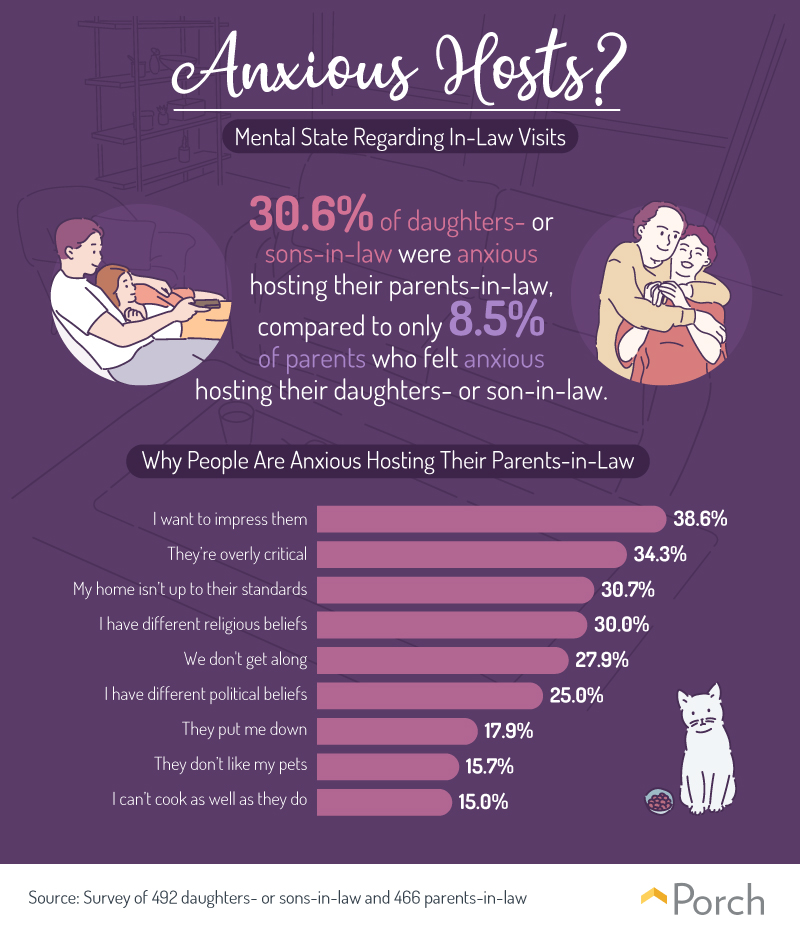 The strife between married couples and their parents often makes a good punchline for jokes, but it can escalate into a serious, irreconcilable concern in some cases. Relationship experts say it’s not uncommon for in-laws to be a regular complaint during therapy sessions in the same way that sex or financial frustrations come up. While these accusations are typically focused on the mother-in-law and describe controlling or manipulative behavior, at least one analysis suggests couples may be unconsciously provoking these uncomfortable interactions in the first place.
The strife between married couples and their parents often makes a good punchline for jokes, but it can escalate into a serious, irreconcilable concern in some cases. Relationship experts say it’s not uncommon for in-laws to be a regular complaint during therapy sessions in the same way that sex or financial frustrations come up. While these accusations are typically focused on the mother-in-law and describe controlling or manipulative behavior, at least one analysis suggests couples may be unconsciously provoking these uncomfortable interactions in the first place.
Nearly 31 percent of couples felt anxious leading up to a visit from their in-laws. Led by a desire to impress their spouse’s parents (39 percent) as well as a concern that they’re overly critical (34 percent) or that their home isn’t up to standards (31 percent), couples were often far more concerned about seeing their in-laws than in-laws were to host their children. Only 8.5 percent of parents were anxious knowing their daughter- or son-in-law would be visiting.
Preparation plans
 You can’t put off seeing your in-laws forever (no matter how uncomfortable they make you), so when the time comes, you might immediately start thinking about how to prepare your home for their descent. Of course, how nervous you are about seeing your in-laws (or how nervous parents are about seeing their children) might determine just how much effort you put into making your home as tidy as possible.
You can’t put off seeing your in-laws forever (no matter how uncomfortable they make you), so when the time comes, you might immediately start thinking about how to prepare your home for their descent. Of course, how nervous you are about seeing your in-laws (or how nervous parents are about seeing their children) might determine just how much effort you put into making your home as tidy as possible.
Sure, there are lots of easy tricks to help reduce the appearance of mess in your home—wipe down high-trafficked surfaces, stuff the dishwasher full of last week’s plates, even light a scented candle in the entryway—but some couples go the extra mile for their in-laws. Sons- and daughters-in-law were more likely to commit a significant amount of time cleaning and organizing their homes. Nearly 1 in 2 couples (48.9 percent) reported doing so, while fewer than 1 in 10 made no effort to spruce the place up prior to hosting.
Although couples were more likely to put in a significant amount of effort, 11.5 percent of parents committed an extreme amount of effort getting ready for their guests, compared to 10.9 percent of couples.
No surface untouched
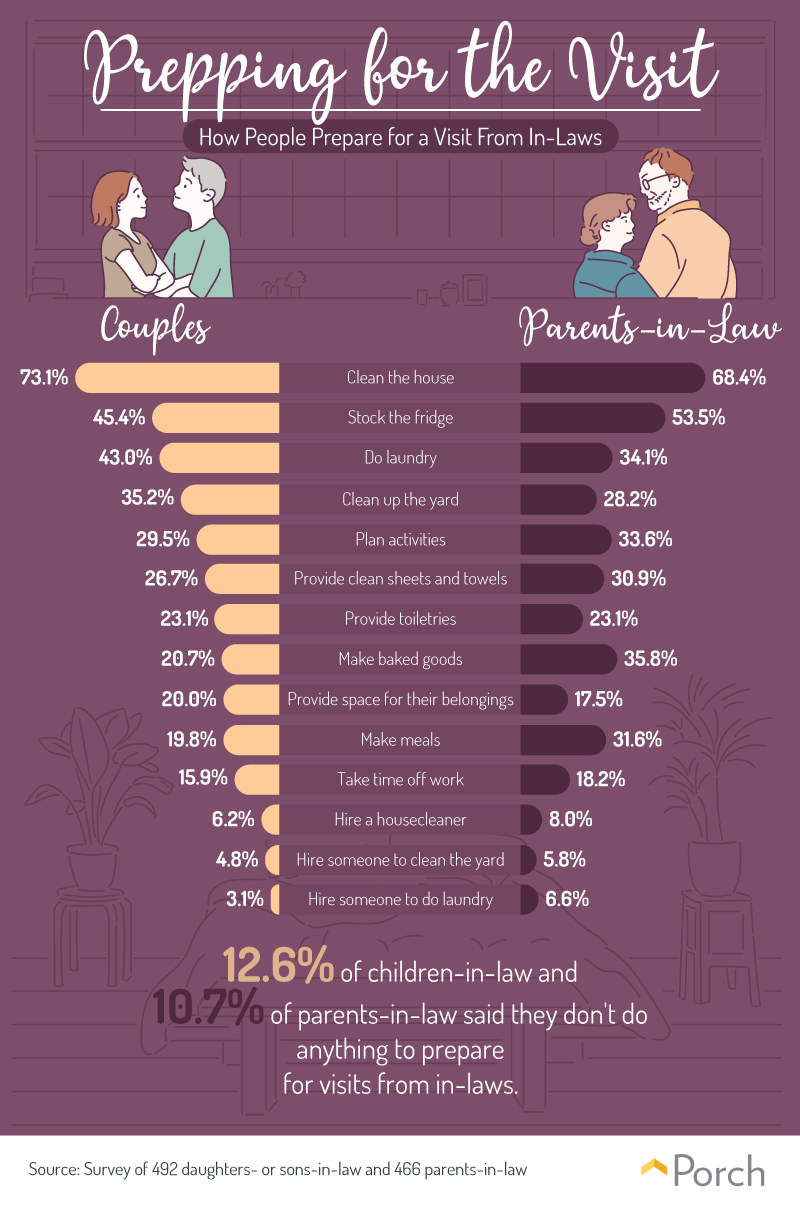 Cleaning your house before friends and family come to visit is one thing, but people we polled might be going above and beyond for their in-laws. While 73 percent of couples and 68 percent of parents acknowledged cleaning their house before a visit, many went even further.
Cleaning your house before friends and family come to visit is one thing, but people we polled might be going above and beyond for their in-laws. While 73 percent of couples and 68 percent of parents acknowledged cleaning their house before a visit, many went even further.
Perhaps to avoid highlighting their affection for takeout or Uber Eats, 54 percent of parents and 45 percent of couples admitted to stocking the fridge in advance of a visit from their in-laws. For couples, common behaviors to prepare for their in-laws to arrive included doing laundry (43 percent), cleaning up the yard (35 percent), and planning activities (30 percent). On the other side of the fence, parents acknowledged focusing on making baked goods (36 percent), planning activities (34 percent), and cooking meals (32 percent) for their married children.
Extended stays
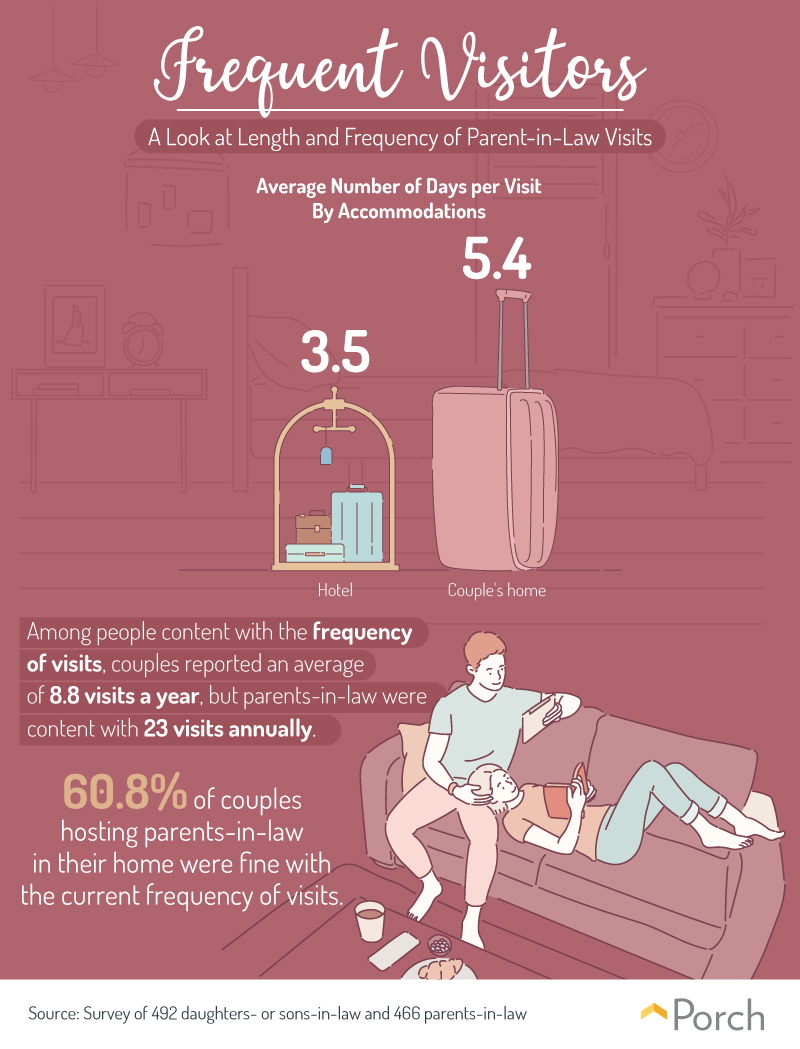 Once the cleaning and prepping are done, you might feel uneasy waiting for your guests to arrive. For some, in-law visits may be an occasional occurrence, while others routinely get ready to receive their out-of-town guests. Couples who were content with the frequency of visits said their parents-in-law visited an average of 8.8 times a year. While that may seem like a healthy amount of family time, parents wanted more. Parents content with their frequency of visits reported nearly three times the amount of visits as couples, with an average of 23 visits a year.
Once the cleaning and prepping are done, you might feel uneasy waiting for your guests to arrive. For some, in-law visits may be an occasional occurrence, while others routinely get ready to receive their out-of-town guests. Couples who were content with the frequency of visits said their parents-in-law visited an average of 8.8 times a year. While that may seem like a healthy amount of family time, parents wanted more. Parents content with their frequency of visits reported nearly three times the amount of visits as couples, with an average of 23 visits a year.
The length of time parents stayed also changed depending on their accommodations. Parents who stayed with their child and daughter- or son-in-law averaged a trip of 5.4 days, while those who stayed in hotels vacationed for an average of 3.5 days. While a longer stay might make some people uncomfortable in their own home, 60.8 percent of couples who hosted their parents-in-law felt fine with how often they visited.
Family bonding time
Sure, getting to spend time with your family is supposed to be a treat. But when it comes to your in-laws, you might be able to think of an entire host of things (some not entirely pleasant) you’d rather do instead of finding yourself locked away with your spouse’s family for an extended weekend or holiday.
As we found, while a vast majority of people reported having a good relationship with their in-laws, many were happy with both the distance between them and the frequency of visits. And as we also discovered, women especially were more inclined to feel uncomfortable at the prospect of having to see their in-laws, feeling anxious and potentially going overboard with cleaning and preparations.
If you want to tackle a few home improvements before your in-laws come to town, Porch has just the professionals to get the job done. With our Porch Pro Network, we’ll help you find the best cleaning crew in your area to come in and spruce the place up without you having to lift a finger. Family gatherings are already awkward enough, so you shouldn’t put any extra pressure on yourself to mow the lawn, do the laundry, or deep clean your home. Ready to see how easy preparing for your in-laws can really be? Visit us online to learn more.
Methodology and limitations
To collect the data shown above, we conducted a survey of 958 respondents. To qualify for this survey, respondents were required to be married and have parents-in-law or have at least one child who is married. Of the 958 respondents, 492 married people with parents-in-law and 466 people with married children were surveyed. We ask respondents questions concerning their relationship with their in-laws and how they feel hosting them in their home.
Because the survey relied on self-reporting, issues such as telescoping and exaggeration could influence responses. An attention-check question was included in the survey to make sure respondents were not randomly answering.
Fair use statement
Worried about having your in-laws over to visit? You’re not alone. Share the concerns with your readers by sharing the results of our study and related graphics for any noncommercial use. Just add a link back to this page in your story and we won’t have to tell your mother-in-law that you borrowed our work.
Sources
- https://www.nbcnews.com/better/health/how-get-along-better-your-laws-week-ncna938521
- https://www.huffingtonpost.co.uk/sarah-alison/why-are-inlaws-so-difficu_b_17377002.html
- https://www.telegraph.co.uk/family/relationships/relationship-women-theirmothers-in-law-often-fraught-itneednt/
- http://www.oprah.com/inspiration/how-to-deal-with-your-mother-in-law
- https://www.psychologytoday.com/us/blog/magnetic-partners/201707/its-not-all-your-mother-in-laws-fault
- https://www.apartmentguide.com/blog/laws-visiting-15-ways-tidy-time

